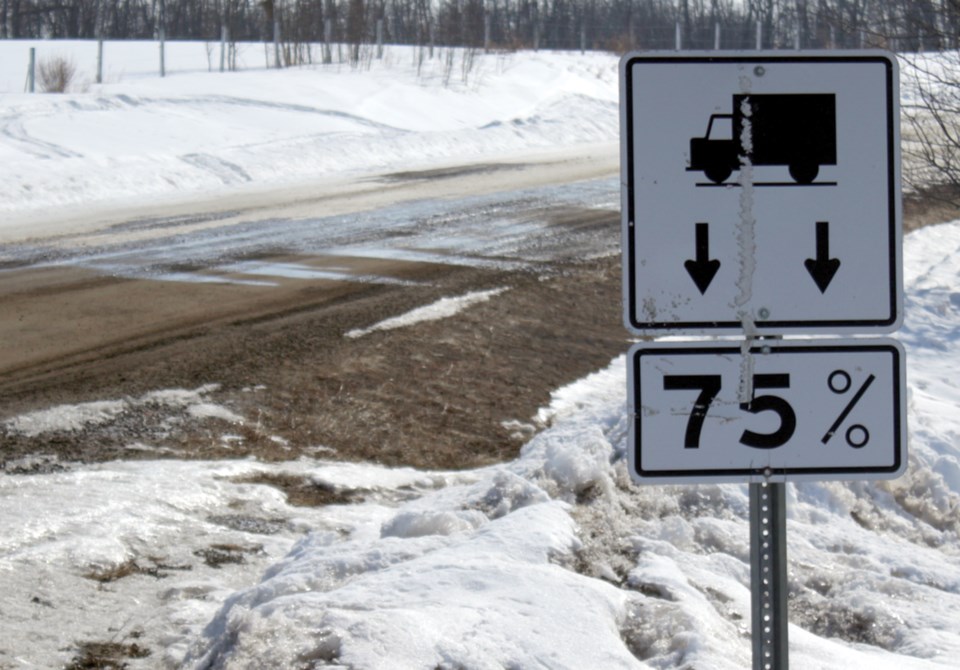WESTLOCK — Agricultural producers who have to haul their product on county roads during springtime road bans will be exempt from paying the refundable $3,000 bond.
Westlock County councillors made the decision March 9, after some listed phone calls with farmers who were concerned about a proposal to change the road use agreement system entirely.
The county stopped issued road ban exemptions at the start of the year, and this recent move to eliminate the bond also means they are reverting on that stance for agricultural producers who need to haul their products. Ag producers will need to enter into a road ban agreement with the county.
In the existing bylaw, road ban exemptions are issued to producers or haulers who need to carry 100 per cent of their legal weight when the county institutes a road ban in exchange for pre-set refundable bonds based on industry type and number of loads.
It's not clear where the county stands on issuing road ban exemptions to other industries.
For ag producers, that bond was set at $3,000. The county’s project manager Al Scott said it was only collected one time because a county rep was present when the damage happened. All other bonds paid by ag producers have been refunded by the county.
Because of low collection rates, deputy reeve Brian Coleman said it made more sense to get rid of the bond entirely and free up administrative resources.
Overhaul of bond system postponed
This recent change in policy also means that councillors decided against following through with a Budget 2021 proposal to get rid of road ban exemptions and replace them with a structured but more costly system, at least for now.
Instead of instituting a policy with which they’ve already agreed in principle — both during budget deliberations and at a January governance and priorities committee meeting — councillors say they have to “get this right” (reeve Jared Stitsen), “dig through everything” (Coun. Lou Hall) and get more public input.
At least two councillors were contacted by haulers who said they were concerned with the proposed policy that would’ve eliminated road use exemptions entirely.
Some, Stitsen said, are worried about contracts they’ve already signed before the new proposal. Others, said Coun. Isaac Skuban, say “there’s a lot of uncertainty” about the inspections, and how the county determines who damages the road.
The new proposed policy “is much more punitive for farmers that deliver grain (than the current policy). … I think that’s the area we really, really have to look at before we approve the new road use agreement,” said Coleman.
The proposal would’ve eliminated road use exemptions and replaced the bond structure with a different fee calculation, only half of which would be refundable.
The number of loads, distance travelled and road type would all be factors in determining the bond amount. The base starting price for gravel roads was $7,500; $10,000 for oiled roads; $14,000 for paved roads; and $1,000 for other roads. The more loads were to be carried and the longer the distance, the higher the bond would have been based on the types of roads used.
Road inspections before and after a haul would have determined the damage done and how much the hauler was responsible for, which would have been subtracted from the refundable portion of the bond.
The proposed policy would’ve evened out the cost between different industry types. All but oilfield companies were eligible for a 50 per cent reduction in bond costs if they supplied their own grader to do any necessary road work once the hauling was finished.
Under the policy currently in effect, and that’ll remain for the time being, oil and gas companies that want to haul during road bans do not pay a bond.
The new fees were meant to recover the costs of maintaining roads and “respond to the use of local road infrastructure that falls outside normal wear and tear,” the proposed policy read.
They’re not getting rid of the proposal, councillors said, but they are at least postponing it for now. What this means for Budget 2021, which in its interim state showed no tax increase, is not clear yet.
“At the end of the day, we have to develop some sort of system to inspect these roads,” said Skuban.
Coleman said scrapping the $3,000 bond doesn’t have any implications because under the current policy, that money is refundable. However, Budget 2021 included the new proposed system outlined above.
Andreea Resmerita, TownandCountryToday.com


